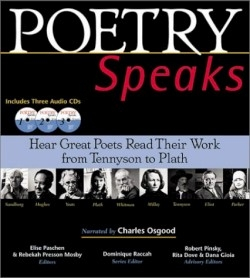Poetry Speaks
Hear Great Poets Read Their Work from Tennyson to Plath
“It gave me a devil of a lot of trouble to get these poems into verse and that is why I will not read them as if they are prose,” begins a stubborn Yeats before his reading of “The Lake Isle of Innisfree.” Seamus Heaney likens Yeats’s reading style to an “elevated chant” in the essay that is a part of this CD-and-anthology package in which forty-two poets are presented with accompanying biographical abstracts and brief literary essays about their work. The essays are written by other, well-known, contemporary poets.
What will strike listeners immediately is the theatricality of the readings by the oldest generation presented, beginning with a wax cylinder recording of Tennyson singing his way through the crackle and roar of the primitive equipment. The poets aligned themselves with a heroic tradition, a sung poetic past. Even Carl Sandburg, the people’s poet, writing with what Rosellen Brown calls “unintimidating and accessible language and a loose prose-like line,” performs in a kind of high song, full of dips and climbs. The poets read into the twentieth century in inherited or invented patrician accents, emphasizing the stature they associated with the role of poet, and their high-minded convictions of what a poem is, or should be, to the world. Elizabeth Spires recognizes in John Berryman his seeking out a “highly wrenched and wrought language that wanted, first and foremost, to dramatically create the poem on an auditory level.”
Whether or not the readings do justice to the work is less important to this project than that their voices are available to hear. To listen to Melvin B. Tolson’s impassioned reading from his first book, Rendezvous with America, (1944)—a book Rita Dove calls “both a promise and a warning”— is to learn something of courage. In this country, Tolson risked something to see and speak so dramatically and so straight. To hear Gertrude Stein’s “She Bowed to Her Brother” is to hear the beginnings of a project that disrupts the high seriousness of the heroic tradition.
The last poet to appear in this chronologically arranged selection is Sylvia Plath. Some recorded poets, like Marianne Moore, are missing. To be included, poets had not only to have recorded, but also to have estates readily grant permission. Some of the recordings are marred by production noise and muffled sound. The anthology has a textbook type format with sidebars illustrating points being made by the contemporary luminaries. The essays describe how the poets achieved their effects. These writers are rightfully more concerned with the forged voices of the poems than the actual voices of the famous readers.
Reviewed by
Bonnie Blader
Disclosure: This article is not an endorsement, but a review. The publisher of this book provided free copies of the book to have their book reviewed by a professional reviewer. No fee was paid by the publisher for this review. Foreword Reviews only recommends books that we love. Foreword Magazine, Inc. is disclosing this in accordance with the Federal Trade Commission’s 16 CFR, Part 255.

